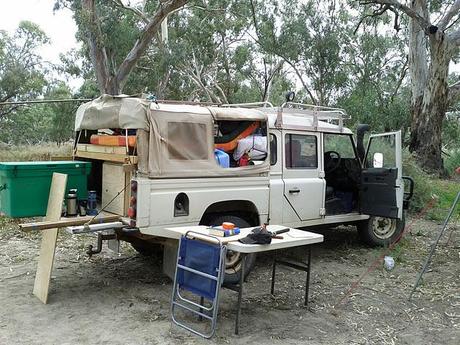
Our Christmas Trip "Up the River" Our neighbours over the lane, the Bessell family, often go away to the Darling River to camp and fish and we decided to join them and head up for the week ourselves. This summer the weather has been surprisingly mild so it was an ideal time to enjoy a visit to the river and the Menindee lakes.
After a few evenings work rearranging the back of the trusty Landrover Defender 130 I was all set. I built myself a camp kitchen with gas cooking and running water and also put a bunk deck system into the back of the Ute so we had options on where to sleep depending on the weather.
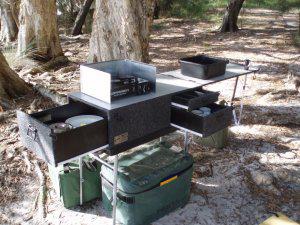
Rather than camp in a traditional tent we set up a mosquito tent which is screen on all four sides with a roof area overhead. This proved to be the ideal outback "tent" as it allowed ample room for all our kitchen gear, fishing gear and bedding and was very quick and easy to erect and pull down. The cool breeze at night through the screening was great.
Many people in the outback use swags to bed down with but they do have a couple of disadvantages. You can't cook and eat in them away from the flies, the mattress is at best only 60mm thick and they can feel stuffy and restrictive on a hot night, even with the best ventilation arrangement. Of course if it rains really hard and sideways, the mozzie tent is next to useless, so the bunk setup in the back of the Ute was the fallback plan.
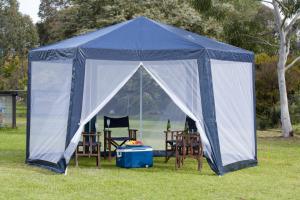
The camp kitchen was modelled on the brilliant designs of Luke from Drifta kitchens based in Gloucester NSW. I would suggest you take a look at Luke's website for some great camping ideas. http://www.drifta.com.au/ I would have purchased one of these myself but the idea was too close to the trip and the kitchen would not have been freighted out in time for the trip. Having purchased all the materials and spent the time building one myself I can happily say Luke's pricing is very reasonable indeed.
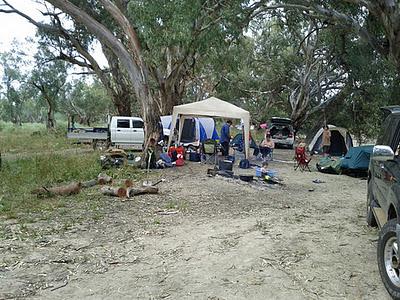
We left Broken Hill at around 2am and stopped on the way to Menindee to drop some yabbie nets in a friendly Cockie's stock dam. Sadly the yabbies were not there in the numbers we expected so we hit the road again. Bessell nailed a pair of 'roo's with the bullbar once we were back on the highway. Kangaroos are a real hazard when night driving in the outback, the best advice is to brake firmly and stay straight, swerving madly to avoid hitting a 'roo can easily get you down onto the soft shoulder of the road and result in a rollover. The best bet is to have good driving lights, back off every time you see anything remotely the shape of a 'roo near the road and stay straight. As it turned out is was pretty quite on the yabbie front for the entire week, we dropped nets in the Darling river, Lake Pamarmaroo and Lake Wetherell. We did get some yabbies and shrimp, enough for bait but not enough for a big boil up feed.
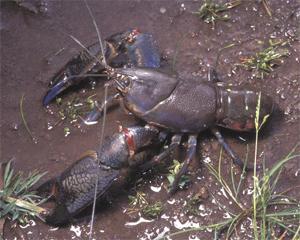
The Darling river was the highest I'd ever seen it and had a discernible flow as the water authority had opened the valve at the Block Dam to allow water to run into the river downstream of Lake Pamarmaroo. Our usual camping spot, a rare flat sand bar on the river was 3/4 under water when we arrived and by the time we left was completely submerged. This made launching and retrieving the boat interesting as the banks of the Darling are quite steep all through this region. If you look over young Bessell's shoulder in this photo of a nice Golden Perch he landed you can see the angle of the bank clearly. This is the way the banks are for many miles along the river.
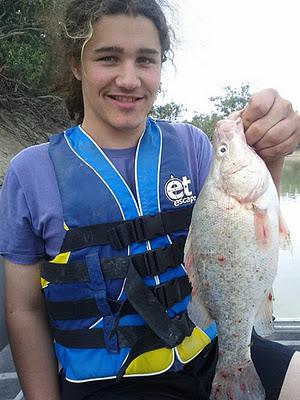
Although the yabbies and shrimp just weren't around in numbers like we'd expected the fish certainly were. I suspect the lower than usual water temperatures for this time of year and the good rains and flows through the system all this year have the yabbies dispersed into areas we just didn't get to. The Perch were fighting fit and in good condition with all of us pretty much catching our bag limit each day from the boat or banks. As usual the Carp were a pain in the ass and prolific everywhere we went. The best Golden Perch landed for the trip was about 5 pounds on the old scale and was a good fish indeed. The bulk of the catch were around 2-3 pounds and fairly lean compared to impoundment fish like those caught in Windermere Dam near Mudgee. What the Perch gave up in size they made up for in fight and taste with many fish fried up or cooked in foil on the campfire coals and gobbled up straight from the river.
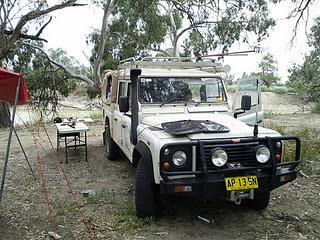
I took a small folding solar panel along on this trip and it came in really handy for charging up all our 12 volt lights, phones and batteries during our stay. A larger set of panels, a deep cycle battery and a 12 volt freezer would be a useful addition to my camping kit for the future. I took more gear this trip than ever before and mostly it was useful and worth the space. As usual I took way too much food and not enough cold drinks. Bessell took too much beer. I was really glad I quit drinking 16 years ago when I saw how crook he was the first morning out in the boat fishing in the hot sun on the river. He had lost his Akubra hat the previous night and was in a sorry state indeed. He ended up throwing up over the side while we all laughed our heads off and stirred him up relentlessly. It didn't stop him catching a bag limit though, being raised on the river he really out fished me in every situation on the Darling. His brother was equally as skillful in hooking the wily Perch. After a couple of days practice I got into the swing of things and landed some nice scrappy little Golden Perch. The Carp I caught were mercilessly dispatched by the young bloke, it is best not to return carp to the river, they are an introduced species and a pest, they compete directly with native fishes over habitat and food.
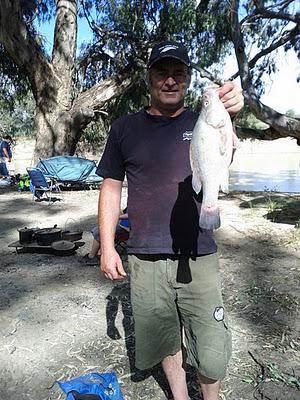
I have spent too many years catching large fish from the surf rocks and beaches where the fish literally smash the bait or lure and hook themselves with little if any effort required by the angler apart from good gear, bait and rigging decisions. A bait or lure in the right place with a natural presentation generally results in a solid hookup. The perch require a real finesse to get a hookup with local knowledge beating broader experiences on locations and species hands down. I was literally ignoring bites that I thought were just tiddler bait fish picking at my bait but which were in fact good Perch biting. This went on for a couple of days till I twigged. Even once I knew the deal, I had countless missed strikes and many fish that I did hook managed to get free by running into the cover of the fallen trees we were fishing in and wrapping my line up in a tangle in about 3 seconds flat. I fished for an average of two hours for every fish I landed, Bessell averaged about ten minutes per fish.
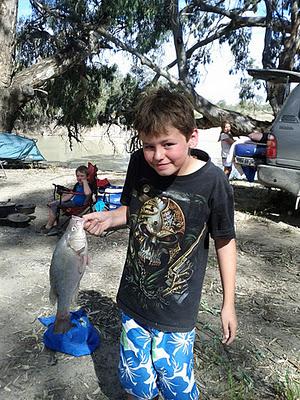
The young bloke landed his first Darling River Golden Perch on our last day on the river completely unassisted, I was up the bank fetching a cold drink. Needless to say he was pretty chuffed. We had already packed up the Defender at this stage, planning to leave after dinner. We knew solid rain was coming according to the reports and it had already sprinkled a bit the previous night and that morning. I winched the boat and trailer up the steep bank for Bessell just in case, after he had described to me how quickly the dry clay banks could turn into a mud slide quagmire if we got ten or twenty millimetres of rain. No sooner we got the boat up onto the flat then down it came hard. It teemed straight down for about half an hour and we were all in a mad scramble packing up. The formerly dry flat ground on top of the bank turned into a slippery sticky thick mud in minutes. My thongs weighed 2KG each and the mud was easily 100mm deep, luckily it backed off for long enough for us to finish packing. Not long after that we left in a convoy of 5 vehicles to slip and slide our way along the track off the floodplain and back to the far more stable red sand access road to the highway.
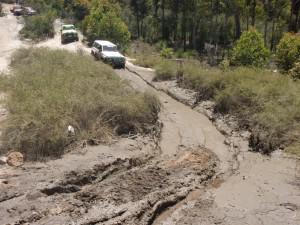
The "real" off road vehicles, including a 100 series cruiser, a Triton Ute towing the boat and my Deefer had no drama's at all with the clay track, but one of the smaller SUV type 4WD's got into real trouble, the mud was so thick and sticky the vehicles rear wheel arches soon became completely packed with clay and so the additional clay being lifted up by the rear wheels had nowhere to go. The rear quarter panels of the vehicle were being bent and forced outward. When we hit the sand road it took half an hour with a long handled shovel to remove enough of the compacted clay so the suspension and brakes could even function again. The vehicle could not do more than 40Km's an hour without bad rear end vibration and had to have the wheels removed and all the clay washed and scraped out before it could be driven on the highway.
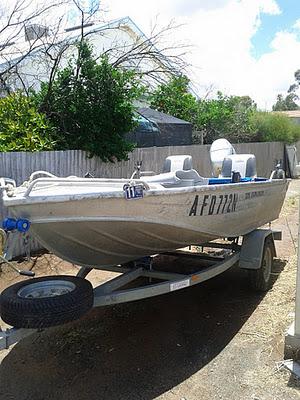
Bessells Quintrex 3.85m boat with the Honda 30 four stroke outboard motor performed flawlessly for the entire week and although small and light it comfortably accommodates four people and all their gear for fishing up and down the river. When we got home to Broken Hill the boat was half full of water and even had a couple of yabbies swimming around in the back amongst all the gear that had been hurriedly stacked into the boat during the downpour pack up. The only thing this great little boat lacks is a folding sun awning. The small depth sounder was very useful enabling Bessell to put us over the deep snags where the fish were gathered with considerable accuracy.
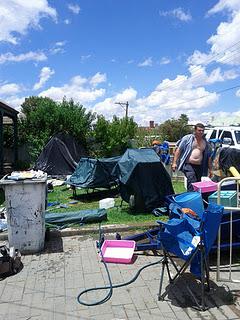
Everything was wet and muddied and had to be washed and dryed out in the sun before it could be packed up ready for the next trip. It was pure luck that I managed to be fully packed up before the downpour as it was an unusual way for the rain to start, high gray cover with some drizzles that suddenly opened up with no noticeable front or change in the breeze. Normally in the outback you can see a solid storm front approaching from 100's of kilometers away and you get ample time to get your gear under cover or packed up. Many times a storm front will arrive with a dust storm and hard winds, thunder and lightning before the first drops even fall. When it does rain out here it rains hard generally, the ground often flash floods while it is teeming down and then an hour or so later it's all over as the storm moves through heading east and the water all just disappears.
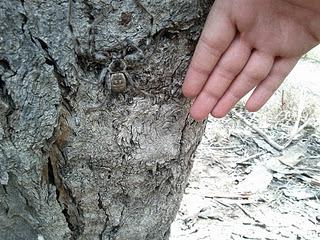
We saw a lot of different species of birds and waterfowl during the week. Plenty of insects, ants, spiders and bugs. The mozzies and flies were light at worst which was great. Lots of kangaroos, a few emus, goannas, goats, a couple of rabbits and one drowned feral pig caught in a fallen tree snag on the river. Snakes were notorious only by their absence in general but no doubt they were around. The spider pictured here is what is locally referred to as a wolf spider and was a good size as you can see. In general the whole area was teeming with life and looked healthy and green. This was a huge change from my previous trip to the river a few years ago when it was very low and the land was dead and dusty with nothing moving apart from a billion flies in the dead dusty heat.
If you are planning a trip out to the Menindee lakes choose the season carefully and make some enquires about the state of the catchment and river, a trip to this region in a good season is a visit to an outback eden well worth the effort. A good site about the region is: http://www.menindeelakes.com All said and done this was a great week up the river and I'm looking forward to heading back again soon. The temperature never got above 35 degrees and although it was more humid than normal for the outback our campsite was shady and well placed to take advantage of the breeze. The kids all had fun playing around with the camp fire and swimming in the river and all us oldies got to forget about work for a while.

